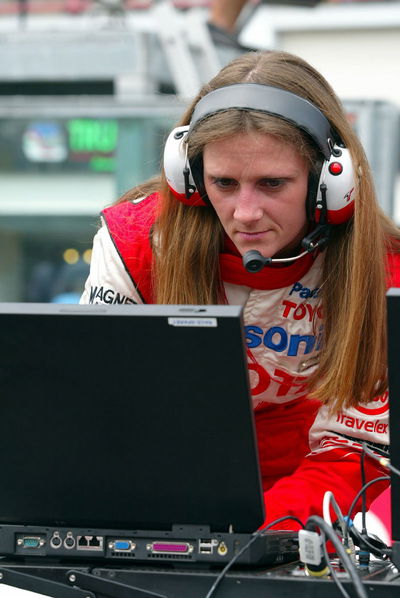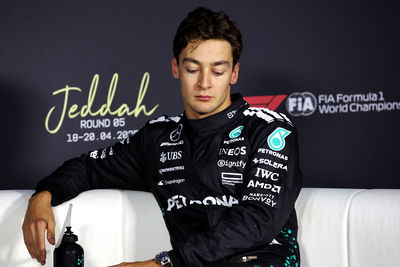Q&A: Gill Hall - electronics engineer, Toyota.
Panasonic Toyota Racing electronics engineer Gill Hall talks about her role at the Cologne based concern, the most interesting part, working in an all male environment and a lot, lot more...
Q:
Gill, what is your main area of responsibility?

Panasonic Toyota Racing electronics engineer Gill Hall talks about her role at the Cologne based concern, the most interesting part, working in an all male environment and a lot, lot more...
Q:
Gill, what is your main area of responsibility?
Gill Hall:
Basically, my role within the Panasonic Toyota Racing team concerns the electronics on Olivier Panis's car and making sure that everything is set up correctly. All the sensors on the car have to be calibrated correctly, so I have to make sure that all the right software is in and that the steering wheel and paddles are set-up. There are lots of things to be taken into account, right down to tyre circumferences, for example, which are different for wets, dries and intermediates.
Q:
Does that mean you can't do too much in advance until you know about the conditions on any given day?
GH:
We prepare the car at the Toyota Motorsport factory in Cologne and do 50-kilometre shakedowns prior to each race, so that we've run the car before we arrive at the track. Everything should be pretty much prepared by the time the car arrives at the circuit and then the control engineers do all their tuning as the weekend goes by. I keep up-to-date with all that and make changes as and when they are required.
Q:
But take races like N?rburgring and Magny Cours, with wet morning practice and different conditions for qualifying. Is that tough?
GH:
We have everything set-up, so all the software is ready to go on the car and we have all the numbers for wet, dry and intermediate tyres. It is simply a case of the driver changing a switch on the steering wheel to differentiate between them. Having said that, the strategy behind the race weekend means we need to do electronic maps, which can change during the day.
Q:
Do you get involved with any of the data analysis?
GH:
In terms of making sure everything is working properly, yes, I do get involved in data analysis. If something doesn't look right we'll have a look at it and try to figure out what's wrong.
Q:
What's the most interesting part of the job?
GH:
Because I was a fan of Formula 1 for about 11 years before, the most interesting thing is getting here and seeing how F1 really operates. You see what really does go on, whereas when you are a spectator you haven't really got a true perception about the massive behind-the-scenes work that goes on. Being able to make some changes to the car's performance and see the effect is rewarding, particularly for such a young team as Toyota where the learning curve is so steep.
Q:
What do you think makes Toyota's F1 challenge special?
GH:
For me it's special because everything we achieve is new and is a first for us. Every point and every good qualifying position shows the progress that the team is making and shows what potential we have for future success.
Q:
How do you feel working in such an international team as Toyota?
GH:
It's great working with people from around the world. The team comprises people from 30 different nations around the globe and although we all have different temperaments and ways of working, it is these differences between us that make it an interesting and fun environment.
Q:
You're probably biased, but as a fan, what about the principle of so many electronic controls. Does it detract from pure driving?
GH:
In my personal opinion, it does and it doesn't. I think it's just a different type of driving. You drive in a way that suits the car that you've got. If you didn't have the driver aids you would simply have to drive in a different way. I think everyone is still competing against each other with different cars and different electronics, so F1 is still at the height of motorsport competition - nothing detracts from that.
Q:
Do you get involved in adjusting traction control in circumstances like this year's Brazilian GP in the torrential rain, or is it all done through steering wheel controls?
GH:
The controls on the steering wheel will have different settings for different maps in a variety of conditions and that is basically how it is done.
Q:
Do you work face-to-face with the drivers on the systems?
GH:
I don't really interface with the drivers much. What I do is largely in the background, but if something went wrong, I will be called upon to rectify the situation.
Q:
Would it, say, be different working on Olivier's car to Cristiano's?
GH:
The job's the same in terms of what you actually do, but you work with your own crew and different people work in different ways. Everyone has his or
her procedure but I occasionally work also on the T-car, so I can notice some slight differences.
Q:
Do you find it difficult working in a male dominated business? Do people give you the respect you deserve?
GH:
I don't think it's hard at all to work in a male dominant business. It takes a little while to gain recognition at first. A lot of people don't really listen to what you say initially, but that changes after a while. I don't think anyone on the team really thinks I'm any different, although I am sure from the outside they do. At university, I was one of only four girls in a group of some eighty men, which was a similar environment to the one I am in now. At the end of the day, it is all about getting the job done and not a question of gender.
Q:
So it doesn't feel too strange being the only girl on the grid?
GH:
The first time I did it I worried that there were going to be loads of people looking at me, but it's not like that at all. You just go there and do your job and you're not thinking about anything else. And, of course, the grid girls are there, so I am in good company!
Q:
What makes F1 more interesting than the aerospace field where you worked before, is it the fact that it's competitive?
GH:
It is better than what I did before because I get to see everything, whereas when I worked on an aeroplane I got to see one little black box and that was it. You tell it what to do with inputs and you see what comes out the other end. But with F1, you see it all come together. Everybody does their own bit, you do your numbers, the mechanics put it all together and the car goes out and does the business. You are more in touch with what you are working for and you feel more pride when the results are good.
Q:
Is the season a hard grind, or are you still enjoying it by August?
GH:
I still enjoy it. At the start of the season everything is new and it begins all over again. Halfway through, you know what you're doing and you're into a routine. It is also encouraging to see the constant progress that we make as the season progresses. We have now picked up 4 points in as many races and actually led a race for 18 laps - this is the sort of morale boost that keeps the whole Toyota team going. If you're passionate about what you do - like we all are - you'll finish the season and immediately look forward to winter testing!










